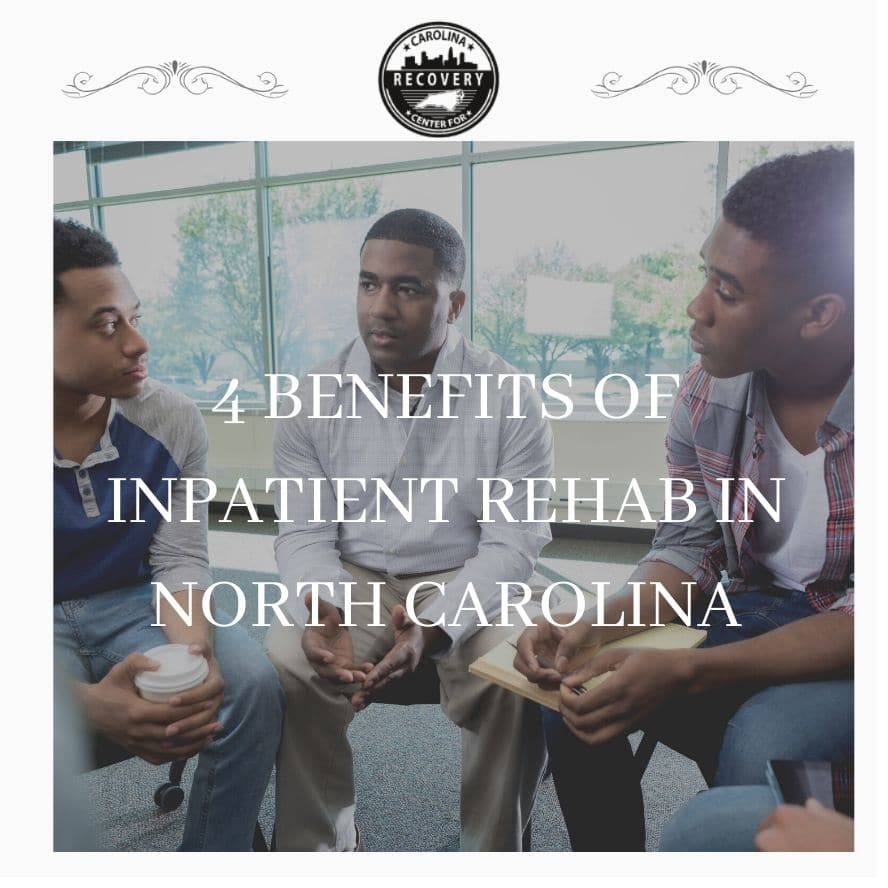4 Benefits of Inpatient Rehab in North Carolina

Medically Verified: 2/1/24
Medical Reviewer
Chief Editor

All of the information on this page has been reviewed and verified by a certified addiction professional.
Addiction is a difficult disease to struggle with, especially if you are doing it alone. Unfortunately, without professional treatment, the symptoms of long-term effects of addiction continue to progress over time. Because of this, individuals must seek some form of professional addiction treatment to make a full recovery.
Each individual who struggles with addiction has a different story, as they come from different backgrounds and lifestyles. Additionally, many people experience varying levels of addiction, from mild, to moderate, and even severe. Depending on the individual’s background and severity of addiction, they will require a different level of addiction treatment. As a result, the substance abuse recovery industry includes multiple different types of addiction treatment programs. These include outpatient, intensive outpatient, and inpatient programs.
Inpatient rehab programs are considered to be the highest level of addiction treatment care, thus providing the highest rates of success and long-term sobriety. Here are the top 4 benefits of inpatient rehab in North Carolina.
What is Inpatient Addiction Treatment?
Inpatient treatment programs require patients to reside on-site, where they will receive 24/7 medical and psychiatric supervision. The average length of inpatient programs is 28 days, however, some people may stay up to 6 months depending on their personal needs.
Individuals will receive various types of therapy and counseling intended to help them work through the root causes of their addiction. Additionally, services will be available for patients with co-occurring mental health conditions.
The overall goal of inpatient treatment is two-fold:
- Ridding the patient’s body of substances. In other words, the patient will be medically-detoxed from the substance they were addicted to. When a patient goes through detox, they may experience symptoms of withdrawal and intense cravings for the substance. Without medical treatment, these symptoms and cravings can become too strong to bear, causing the individual to use drugs or alcohol again. By attending detox in an inpatient facility, individuals will avoid uncomfortable and life-threatening symptoms of withdrawal.[1]
- Once detox is completed, individuals in an inpatient program will begin to learn coping techniques to help them navigate and maintain sobriety. This is achieved through individual and group therapy sessions that take place on a daily basis. Eventually, patients will be prepared to maintain their sobriety in their normal lives.
The 4 Benefits of Inpatient Rehab in North Carolina
There are many benefits of attending an inpatient addiction treatment program, especially when you consider that this is the highest level of substance abuse treatment available. However, there are 4 advantages that really stand out.
1. Inpatient Rehab Provides 24/7 Supervision
During inpatient treatment, patients are supervised and monitored for physical and mental safety around the clock. During the early stages of addiction, individuals tend to be very fragile – physically and mentally. Due to this, having 24/7 medical and psychiatric care is vital to one’s chances at long-term sobriety.
Inpatient rehab is beneficial for individuals who:
- Have not had success in outpatient programs
- Are at risk of self-harm or suicide
- Have a long history of drug abuse and withdrawal symptoms
- Are currently pregnant
- Have co-occurring mental health disorders
- Do not have a supportive network of family or friends at home
Inpatient rehab programs in North Carolina provide patients with a safe, controlled, and organized space to open up and express their true feelings. During the detox process, withdrawal symptoms may cause an individual’s emotions to be amplified. Having qualified mental health professionals on call is very beneficial during this time.
2. A Built-In Network of Sober Support
Inpatient rehab facilities in North Carolina provide patients with as much support as they could possibly need. Many programs offer individualized treatment plans, which allow staff members to focus on the specific needs of each patient.
In addition to staff support, patients have the opportunity to provide support to each other while they heal. Oftentimes, many patients will have previously attended rehab, allowing them to provide helpful insight and tips to first-time patients.
3. Access to Evidence-Based Therapies
After detoxing, therapy is the most important aspect of addiction recovery. Therapy helps patients learn how to cope with stress, allowing them to prevent a relapse in the future. Inpatient programs utilize evidence-based therapies, meaning they have been scientifically proven to be effective in treating addiction.
These therapies include:[2]
- Mindfulness-based cognitive therapy
- Cognitive-behavioral therapy
- Group therapy
- Family therapy
- Dialectical behavior therapy
- 12-step facilitation
- Motivational interviewing
4. Inpatient Rehab Has Higher Rates of Success
It is widely accepted that inpatient treatment programs provide the highest rates of success for addiction recovery. This is due to a combination of constant support, the utilization of evidence-based therapies, and the use of personalized treatment plans for each patient. For example, research has found that inpatient addiction treatment had a success rate of 63%, while outpatient services received a success rate of 38%.[3]
If you or a loved one are currently dealing with the effects of drug or alcohol addiction, it may be time to consider inpatient rehab. To learn more about the benefits of inpatient rehab in North Carolina, contact us today.
References:

